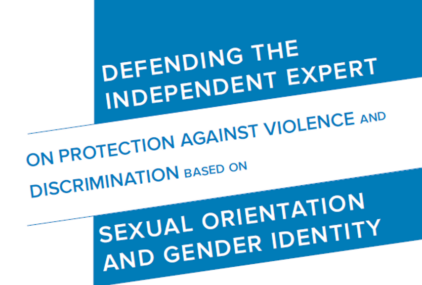
Latin American feminism at EFLAC
Montevideo (Uruguay) was the stage of the 14th Latin American and Caribbean Feminist Gathering (EFLAC in Spanish), where women gathered from the 23 to 25 of
The Anatrella case and the silence from the “family defenders”
What happens when a big name of the anti-gender crusade is involved in a sex scandal? By Rogério Diniz Junqueira* Monsignor Tony Anatrella is a
Report ‘Defending the UN Independent Expert on SOGI’
The IE SOGI mandate was created through UN Human Rights Council resolution A/HRC/RES/32/2 in June of last year and was confirmed through six separate votes

Report of the IE on protection against violence and discrimination based on SOGI
Below you will find the summary for the report of the Independent Expert on protection against violence and discrimination based on sexual orientation and gender identity,
Health and Human Rights Journal – Vol 19, Issue 1, June 2017
Table of Contents Special Section: Abortion and Human Rights GUEST EDITORS Alicia Ely Yamin, Paola Bergallo, and Marge Berer EDITORIAL Narratives of Essentialism and Exceptionalism:

Civil Society Note Brazil in the UPR 2017
The Brazilian civil society organizations attending the process of the Universal Periodic Revision of Brazil at the United Nations (UN) want to manifest their position

#IresistWePersist Campaign Toolkit 2017
September 28 has been a regional campaign for the decriminalization of abortion in Latin America and the Caribbean for over twenty years before being taken
Sexual Politics in August 2017
Two outstandingly positive news are to be reported in sexual politics worldwide in August 2017. In India, the Supreme Court issued a groundbreaking decision on

Sexual Politics in July 2017
In July, once again, contradictory trends were registered in the abortion frontline. In Chile, the processing of a bill aimed at legalizing abortion in three cases

Brazil’s Amnesty International: Human Rights Are Not For Sale
Brazil: New Amnesty campaign will fight back as Congress considers legal changes that flagrantly attack human rights Amnesty International defending rights at risk in Brazil




